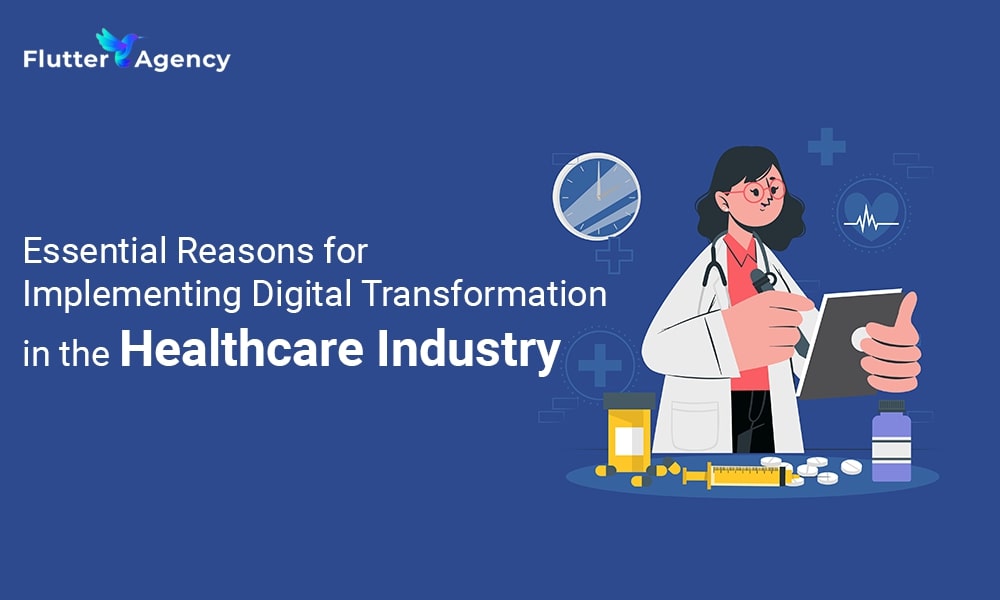Why Does the Healthcare Industry Need to Implement Digital Transformation?
In the current technological environment, it is unsurprising that the healthcare sector is going through a digital revolution and offering its essential services online. We have witnessed several digital healthcare trends entering our daily lives, from tracking calories and other fitness metrics to online doctor consultations.
According to a Statista analysis, it is projected that by 2025, the global market for digital health will achieve a value surpassing $657 billion. Implementing the advice of digital professionals is necessary to take advantage of the advantages of the digital healthcare transformation. So, let’s get immediately and explore the advantages of these revolutionary modifications as we examine the field of digital transformation in healthcare.
In the healthcare sector, what does digital transformation mean?
Digital transformation in healthcare means applying cutting-edge digital technology, strategies, and solutions to enhance various aspects of the healthcare sector. The digital transformation of healthcare app development aims to improve patient experience, streamline operations, increase primary healthcare efficiency, and improve overall healthcare operations.
By accepting digital transformation, healthcare providers may provide their patients with the convenience of online doctor consultations, appointment scheduling, and medication ordering from the comfort of their homes. To prevent the worst chronic illnesses and create a healthy environment, they can maintain patient data synchronization with their cloud-based systems and use EHR data to gain better healthcare insights on disease detection and better therapies.
What are the Benefits of Digital Transformation in the Healthcare Industry?
Digital transformation is the process of adopting new technologies to improve the efficiency and effectiveness of an organization. In the healthcare industry, digital transformation can have several benefits, including:
Improved patient care: Digital transformation can help to improve patient care by providing patients with more access to information and services. For example, patients can now use online portals to book doctor appointments, view their medical records, and communicate with their doctors.
Increased efficiency: Digital transformation can increase efficiency by automating tasks and streamlining processes. For example, hospitals can use electronic health records (EHRs) to track patient information and make it easier for doctors to access the necessary information.
Reduced costs: Digital transformation can help to reduce costs by eliminating the need for paper records and reducing the number of administrative tasks. For example, hospitals can use electronic billing systems to automate the billing process and reduce the number of errors.
Improved decision-making: Digital transformation can help to improve decision-making by providing healthcare providers with more data and information. For example, hospitals can use data analytics to identify healthcare development trends and make better resource allocation decisions.
Enhanced patient engagement: Digital transformation can improve patient engagement by giving patients more opportunities to participate in their care. For example, patients can use wearable devices to track their health data and share it with their doctors.
Therefore, digital transformation has the potential to revolutionize the healthcare industry. By adopting new technologies, healthcare providers can improve patient care, increase efficiency, reduce costs, improve decision-making, and enhance patient engagement.
Challenges of Digital Transformation in Healthcare
I. Interoperability Issues:
One of the significant challenges in digital transformation is the need for interoperability among various healthcare systems. Different platforms and electronic health record (EHR) systems may use diverse standards, hindering seamless data exchange. Achieving interoperability is crucial for ensuring patient data can be shared efficiently among healthcare providers, leading to more coordinated and comprehensive care.
II. Data Security and Privacy Concerns:
The digitization of healthcare information raises significant concerns about data security and patient privacy. The vast amounts of sensitive patient data, from medical records to personal information, become targets for cyber threats. Maintaining robust cybersecurity measures and ensuring compliance with data protection regulations are imperative to build patient trust and safeguard their confidential information.
III. Resistance to Change:
Resistance to change is a pervasive challenge in the healthcare sector. The transition from traditional paper-based systems to digital platforms often encounters resistance from healthcare professionals accustomed to established practices. Adequate training, change management strategies, and fostering a culture that values innovation is essential to overcome resistance and ensure a smooth digital transformation process.
IV. Cost and Resource Constraints:
While digital transformation promises long-term efficiency gains, the initial costs and resource requirements can be substantial. Implementing new technologies, training staff, and maintaining cybersecurity measures demand financial investment. For many healthcare organizations, particularly smaller ones, these costs can pose a significant challenge. Addressing budgetary constraints and developing a clear return on investment (ROI) strategy are essential for sustainable digital transformation.
V. Integration of Legacy Systems:
Many healthcare organizations operate with legacy systems that may need to be compatible with modern digital technologies. Integrating these legacy systems with new digital solutions can be complex and time-consuming. Legacy systems may not support interoperability or meet current security standards, necessitating careful planning and gradual integration to avoid disruptions in healthcare services.
VI. Regulatory Compliance:
The healthcare industry is subject to stringent regulatory requirements to ensure patient safety and data privacy. They adhere to regulations such as the Health Insurance Portability and Accountability Act (HIPAA) in the United States and the General Data Protection Regulation (GDPR) in Europe. Ensuring digital transformation initiatives comply with these regulations adds complexity and requires ongoing vigilance.
VII. Patient Engagement and Adoption:
Effective digital transformation involves active patient engagement and the adoption of new technologies. However, ensuring patients are comfortable using digital tools, such as patient portals or telehealth platforms, can be challenging. Overcoming issues related to digital literacy and accessibility and providing a positive user experience are vital for encouraging widespread adoption among diverse patient populations.
VIII. Scalability and Flexibility:
Healthcare organizations must plan for scalability to accommodate the evolving nature of healthcare delivery. The digital solutions implemented should be scalable to handle increasing data volumes, technological advancements, and changing healthcare needs. Flexibility in adapting to emerging technologies without disrupting existing workflows is crucial for long-term success.
IX. Ethical and Legal Considerations:
Digital transformation introduces ethical considerations, such as the responsible use of artificial intelligence (AI) in healthcare decision-making. Additionally, legal frameworks may need to adapt to technological advancements, requiring healthcare organizations to navigate evolving ethical standards and anticipate potential legal challenges.
X. Continuous Innovation:
The rapid pace of technological advancement requires healthcare organizations to embrace a culture of continuous innovation. Keeping abreast of emerging technologies, updating digital infrastructure, and fostering a mindset that encourages innovation are essential to stay ahead in the evolving landscape of digital healthcare.
Wrap Up
The imperative shift toward digital transformation in healthcare brings many benefits, from improved patient care to increased efficiency and reduced costs. Despite the notable advantages, challenges such as interoperability, data security concerns, and resistance to change must be navigated adeptly. Overcoming these hurdles requires strategic planning, technological integration, and a commitment to innovation. Partnering with the best healthcare app development company in the USA becomes paramount to embarking on a successful digital transformation journey. Choosing a reputable development partner ensures the seamless integration of cutting-edge technologies, fostering a future-ready healthcare ecosystem.
Develop Your Healthcare App Now
Contemporary ventures
Recent blog
ready to get started?
Fill out the form below and we will be in touch soon!
"*" indicates required fields













